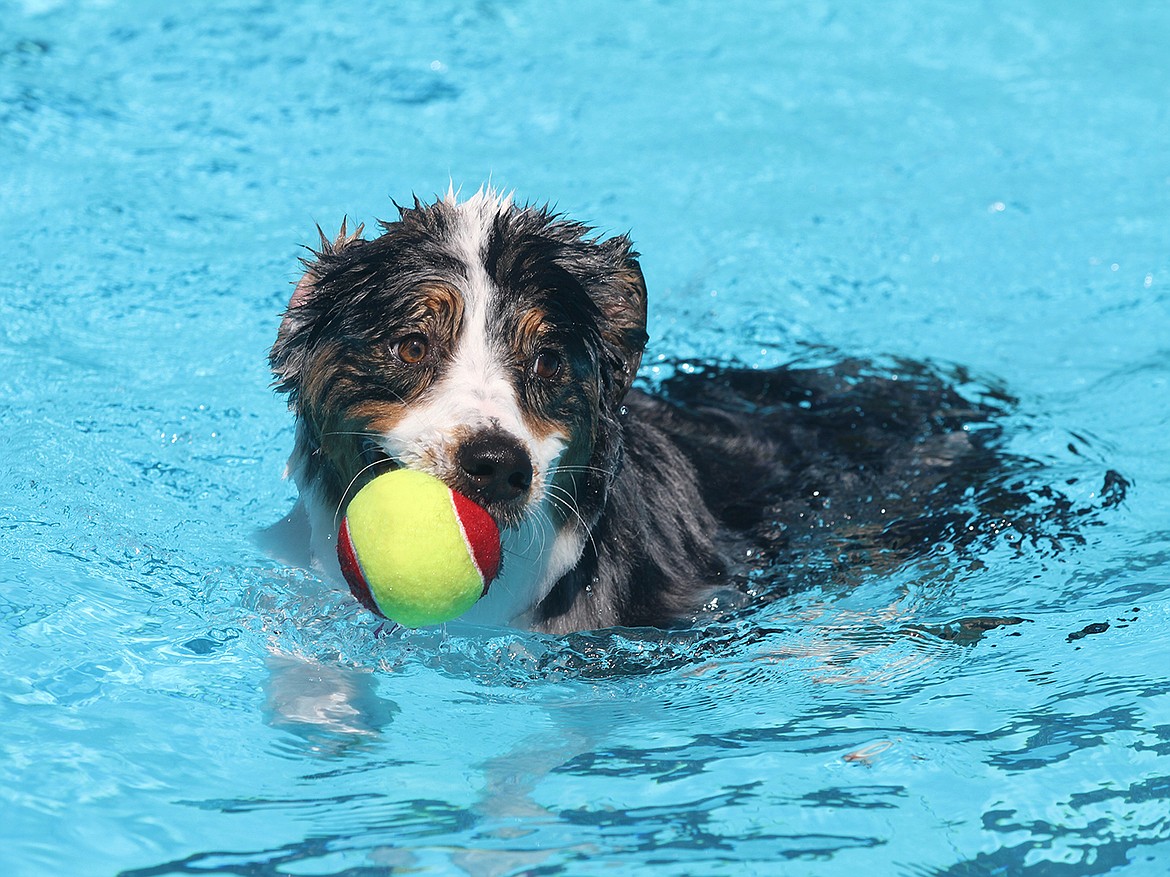Keep it cool for your pups this summer
| May 23, 2022 1:20 AM
When the weather heats up, many people and pups love getting in the water to cool down. Whether a dog enjoys swimming or just splashing in the shallows, there are several things to keep in mind to ensure they stay safe this summer.
While it’s a common belief that all dogs can swim, this is actually a myth, according to Dr. Lori Teller, a clinical associate professor at the Texas A&M College of Veterinary Medicine & Biomedical Sciences.
“Most dogs will make a paddling motion when in the water, but some are not able to propel themselves forward or even keep their heads above water,” she said.
In particular, brachycephalic dogs with large heads and flat faces, like pugs and bulldogs, tend to have the most trouble swimming.
“If your dog is not interested in swimming, don’t force it,” Teller said. “Never toss your dog in the pool to make it swim. For dogs that want to get in the pool but cannot swim, or if you have a dog that may be at risk of drowning, use a doggie life jacket. If your dog falls in or can’t swim, this will allow your dog to float in the pool until it can be rescued.”
Dogs that enjoy swimming should be provided a bowl of fresh water to drink even though the small amount of chlorine in swimming pools is usually not strong enough to cause harm. Chlorine tablets and undiluted chemicals, however, can cause serious danger and should be kept out of reach.
Lakes and rivers can also be a fun swimming spot, as long as owners take care to avoid areas with cyanobacteria, also known as blue-green algae.
“These algae bloom most commonly in stagnant, shallow, warm water and produce some toxic substances,” Teller said. “It takes a very small amount of the toxins to cause serious illness or death in a dog.”
The toxins cause a range of symptoms, including bluish mucus membranes (gums and inside the nose), vomiting, muscle rigidity, seizures, and liver failure. Because the effects are so serious, many state agencies have monitoring programs for public recreational water locations and post announcements about blue-green algae on their websites.
Some dogs that aren’t interested in swimming in pools or lakes can still enjoy splashing at the beach and running into the waves, but the salty water can bring its own set of issues.
“If your dog ingests a small amount of sea water while playing, it may develop a little diarrhea but otherwise be OK,” Teller said. “However, if your dog ingests large quantities of sea water, it can potentially be fatal. The increased level of salt can disrupt the function of multiple organs and lead to seizures and kidney problems.”
Therefore, it is important that owners always provide fresh water at the beach and seek emergency veterinary care if a dog begins vomiting or exhibiting abnormal behavior after drinking sea water.
“After swimming—whether in a pool, river, lake, or ocean—rinse off your dog with clean water to remove chlorine, other chemicals, and any debris,” Teller said. “Dry your dog well, especially any skin folds and the ears, to avoid inflammation or infection. If your dog gets ear infections after swimming, ask your veterinarian about a medicated cleanser that can help prevent problems.”
Teller reminds owners to be cautious when bathing or rinsing dogs with a hose during the summer.
“Be sure to run the water in the hose for a few minutes before wetting your dog,” she said. “The water that remains in the hose between uses gets extremely hot, and if it contacts your dog’s skin, it can cause second- or third-degree burns. These are extremely painful, require intensive veterinary care, and can lead to permanent scarring.”
Finally, for every dog that loves swimming, there is another that wants nothing to do with it.
“Dogs that don’t like to swim may still enjoy hanging out at the water’s edge, sharing a float with their owner, cooling off in a kiddie pool, or playing with kids on a slip-n-slide,” Teller said.
Owners can also help their dogs enjoy the summer by going on walks during the cooler parts of the day and making dog-safe popsicles out of frozen chicken or beef broth.
Whether a dog loves the water or prefers dry land, there are many ways to stay cool while having fun in the sun. This summer is the perfect time to discover new activities that the entire family, including dogs, will enjoy.
Pet Talk is a service of the College of Veterinary Medicine & Biomedical Sciences, Texas A&M University. Stories can be viewed on the web at vetmed.tamu.edu/news/pet-talk. Suggestions for future topics may be directed to editor@cvm.tamu.edu.



